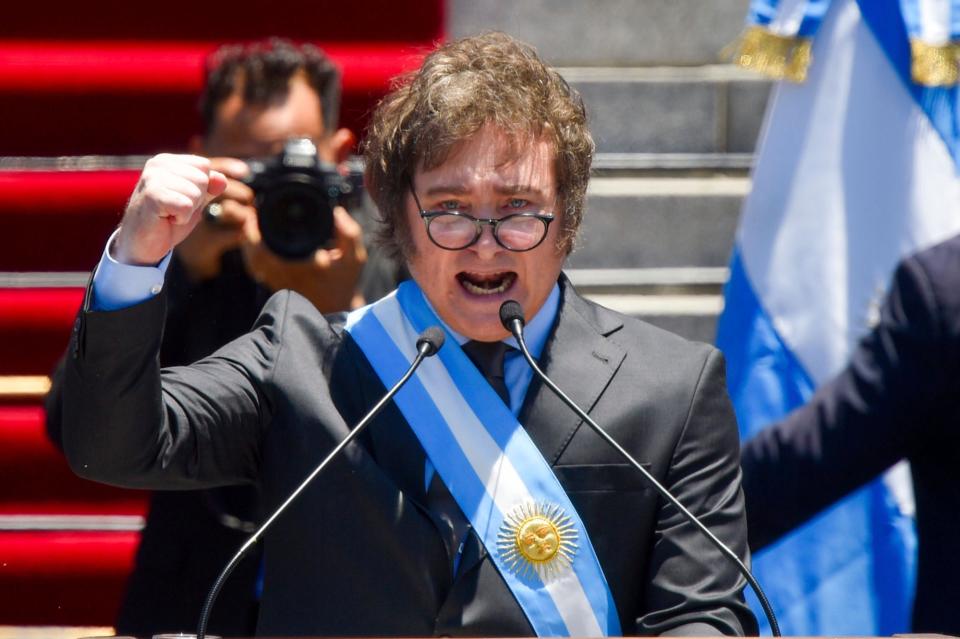
China has suspended a US$6.5 billion currency swap agreement with Argentina, and the freeze remains in effect until President Javier Milei demonstrates a clear intention to engage with Beijing, Argentine media have reported.
News of the move comes just 10 days into the tenure of the new president, who campaigned on breaking ties with China, and underscores the challenge Milei will face in trying to follow through with those pledges.
Asked to comment, Zhicheng Xie, the spokesperson for the Chinese embassy in Argentina, declined to confirm the reports.
Do you have questions about the biggest topics and trends from around the world? Get the answers with SCMP Knowledge, our new platform of curated content with explainers, FAQs, analyses and infographics brought to you by our award-winning team.
In Beijing, Chinese Foreign Ministry spokesperson Wang Wenbin also refused to confirm or deny the reports on Wednesday, only saying that China remained committed “to cooperation with Argentina on the basis of equality and mutual benefit”.


Argentine President Javier Milei speaking at his inauguration on December 10 in Buenos Aires. Photo: AP alt=Argentine President Javier Milei speaking at his inauguration on December 10 in Buenos Aires. Photo: AP>
The funding is part of a deal renewed annually since 2009, crucial for Buenos Aires due to its negative holdings of international dollar reserves. Argentina has relied on such swaps as one of its few credit options, given the South American nation’s reputation for defaulting on international debt.
The funds, which China first promised in October to Sergio Massa, then Argentina’s economic minister, were primarily intended to bolster imports and meet obligations to the International Monetary Fund.
Massa was also running for president at the time and lost to Milei, whose campaign included significant anti-China rhetoric. Despite that, after his inauguration on December 10, Milei reached out to Chinese President Xi Jinping and requested continuation of those agreements, according to Pagina 12, an Argentine newspaper.
Two days later, Argentina’s foreign affairs minister, Diana Mondino, met with Wu Weihua, Xi’s special envoy to the inauguration, and urged a swift renewal of the agreement.
According to Infobae, an Argentine news website, China’s decision followed Argentina’s purchase of used F-16 fighters from Denmark. The aircraft were originally manufactured in the US.
Confirmation of the deal has not been officially announced, but Infobae reported that Luis Petri, Argentina’s defence minister, met on Monday with Xavier Julian Isaac, the brigadier general of its air force, to confirm Milei’s intention to acquire the F-16s.
Before Milei’s election, Argentina had been in talks to acquire new Chinese JF-17 Thunder jets. That prospect reportedly displeased Washington, which is trying to limit Beijing’s influence in South America.
The US has not only approved the sale of the F-16s to Argentina but also pledged weapons, training, logistical support and spare parts for the jets.
Infobae also reported that China was waiting for “a clear gesture of goodwill or friendship” from Argentina to resume the currency swap.
The news site said that China’s ambassador to Argentina, Wang Wei, had been recalled to Beijing to discuss Milei’s plans and approach to projects Xi has prioritised.
Patricio Giusto of the Sino-Argentine Observatory in Buenos Aires called China’s freezing of funds concerning. Without the financial cushion provided by the US$6.5 billion, he noted, Argentina would need to renegotiate its debt with the IMF, demanding a search for alternative funding sources, a task Giusto deemed “not easy at all”.
Giusto suggested that China’s displeasure might extend beyond these individual decisions, seeking a broader shift in Argentine foreign policy. Buenos Aires’ recent refusal to join the China-led Brics economic bloc, and its potential abandonment of a Belt and Road Initiative project signal a possible realignment of Argentina’s international partnerships, which might prompt China to exert pressure through economic means.
“This interdependence we have with China is irreplaceable. We cannot replace it now with the US or Europe,” he said.
Milei’s administration, he said, should “try to understand better what China represents and how Chinese diplomacy works, because there will be a lot of trouble ahead if this [relationship] is not properly addressed”.
This article originally appeared in the South China Morning Post (SCMP), the most authoritative voice reporting on China and Asia for more than a century. For more SCMP stories, please explore the SCMP app or visit the SCMP’s Facebook and Twitter pages. Copyright © 2023 South China Morning Post Publishers Ltd. All rights reserved.
Copyright (c) 2023. South China Morning Post Publishers Ltd. All rights reserved.



